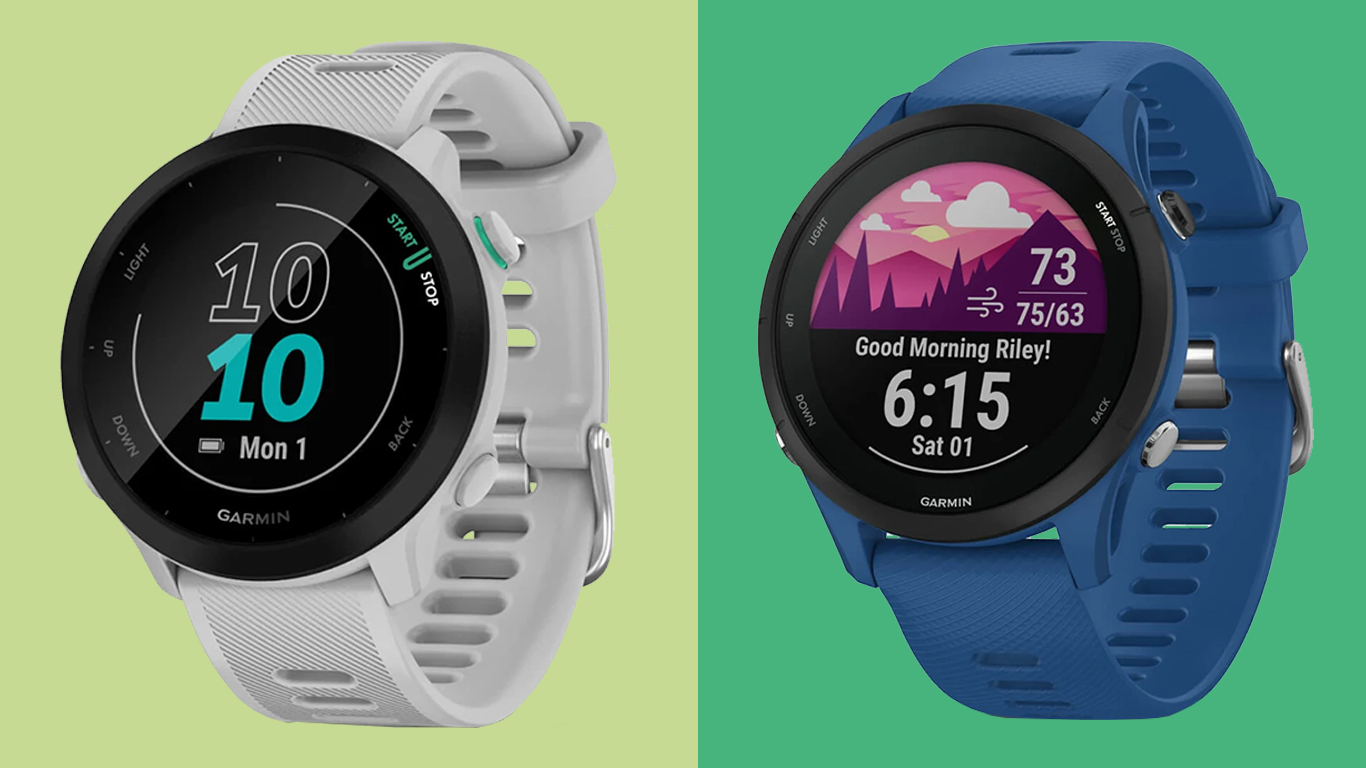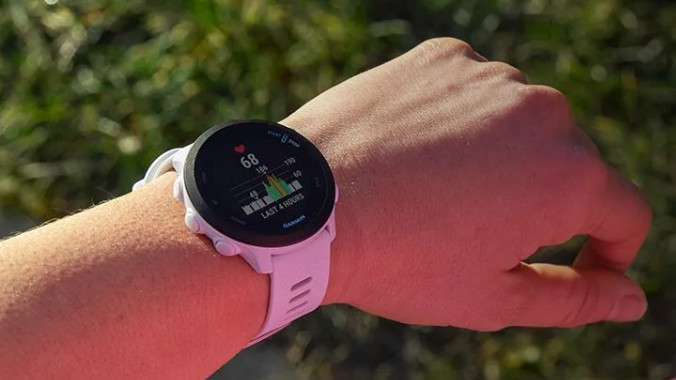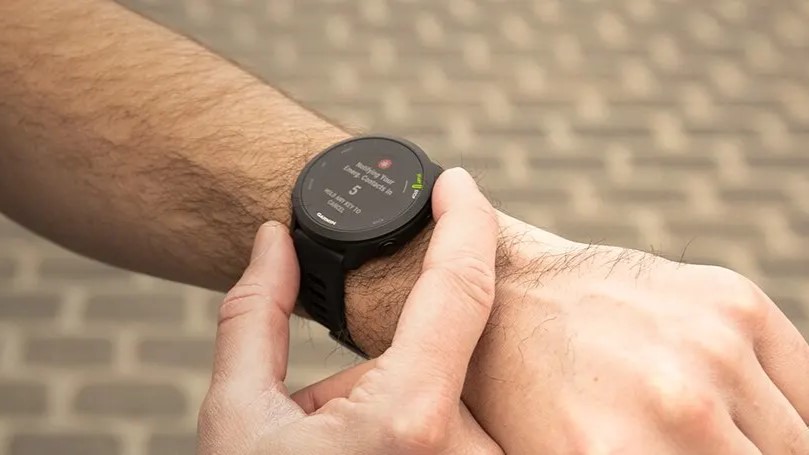
An entry-level triathlon watch, the Forerunner 255 is also a great choice if you're an intermediate runner. Unlike the 55, it allows you to upload custom courses, and there's great support for a much wider range of activities. It's a little pricier, but if you enjoy multiple sports then it could be worth the outlay.
For
- Triathlon mode
- Choice of sizes
- Multi-band GPS
Against
- More expensive
As a run leader, the Forerunner 55 is the device recommend to anyone looking for their first running watch. It's affordable but covers all the basics and has impressive GPS accuracy despite the lack of multi-band support. A great option if you don't want to pay for advanced features you don't need.
For
- Affordably priced
- Very light and compact
- Won't overwhelm new runners
Against
- Shorter battery life
- No custom courses
- Fewer activities supported
Garmin Forerunner 255 vs 55: introduction
The Forerunner 55 and 255 are two of Garmin's most affordable GPS watches, but neither of them skimps on features. These are both serious training tools that will help you manage your training, balance effort with rest, and work towards improving your times, conquering hills, or going further than ever.
At first they look very similar, but there are some key differences to be aware of when making your choice. The most important thing to bear in mind is that the Forerunner 55 is first and foremost a running watch. Yes, there are other activity tracking options here, including pool swimming and cycling, but this is a watch made for people whose main sport is getting out and pounding the pavements.
The Forerunner 255, on the other hand, is a true multi-sports watch capable of tracking a much wider range of activities, and with a dedicated triathlon mode so you can switch between stages with the press of a button.

The Forerunner 255 comes in a choice of two sizes, the larger of which has significantly improved battery life. There's also a music edition available if you want to listen to songs and podcasts directly from your watch and leave your phone at home.
Naturally all this comes at a price, and the Forerunner 255 costs around $50/£50 more than the Forerunner 55. Whether it's worth the extra expense will depend on what you want to use it for.
If you've made up your mind, you'll find today's best deals on the Forerunner 55 and 255 above. Otherwise, read on for the full lowdown on both Garmin watches to help you make the right decision.
Garmin Forerunner 255 vs 55: price
- Garmin Forerunner 255 cost $50 more at launch
- Both watches can usually be found discounted
The Garmin Forerunner 55 is one of the best budget GPS watches you can buy. It cost $199.99/£179.99 when it launched in June 2021, and can now be found for as little as £150 in the UK, or $170 in the US during sales.
The Forerunner 255 was $349.99/£299.99 at launch in June 2022, increasing to $399.99/£349.99 for the music edition. Both can now be found for around $50/£50 less if you shop around.
You'll find all today's best prices on both watches here:

Garmin Forerunner 255 vs 55: design
- Forerunner 255 comes in two sizes
- Forerunner 55 is lighter
- Neither watch has touch controls
Both these watches have fiber-reinforced resin cases and silicone straps. There's no option to upgrade to a metal bezel, but you can switch the band to a different material if you buy one separately. Both watches have a water resistance rating of 5atm, making them suitable for regular swimming, but not diving.
Both have Garmin's standard array of five buttons around the bezel and a color memory-in-pixel display, but neither has touch controls.
The Forerunner 55 comes in just one size, with a case measuring 42 x 42 x 11.6mm and weighing 37g. That makes it the lightest Garmin Forerunner watch you can buy.
The Forerunner 255 is available in two sizes: the standard 45.6 x 45.6 x 12.9mm version, and the more compact Forerunner 255S, which measures 41 x 41 x 12.4mm. There are also music editions of both 255 devices, which weigh and measure the same.
The standard Foreunner 255 weighs 49g, while the smaller 255S is 39g. In real world use, the difference between the 55 and 255S is imperceptible.

Garmin Forerunner 255 vs 55: battery life
- Both watches last over a week in typical use
- 255 has significantly longer battery life in GPS mode
Battery life in smartwatch mode is dependent on the size of the watch, with the smallest model (the 255S) lasting up to 12 days before needing a charge. This is very respectable for a watch at this price point; for comparison, the Garmin Fenix 7S has a battery life of only 11 days in smartwatch mode. During my tests, I found that the 255S easily lasted over a week with regular use of GPS for tracking runs.
When you're out on the road, you can expect both the Forerunner 255S and 255 to last significantly longer than the 55, with the largest watch delivering the best performance.
Garmin Forerunner 255 vs 55: fitness tracking
- Forerunner 55 is primarily a running watch
- Forerunner 255 tracks many more activities
- Only Forerunner 255 supports custom courses
Although it has a selection of activity tracking modes. the Garmin Forerunner 55 is primarily a running watch. The Forerunner 255, on the other hand, is a true multi-sports watch with a dedicated triathlon mode that allows you to switch between stages with the press of a button rather than tracking each activity individually.
The 55 has a simple set of workout modes that cover the basics for most beginner and intermediate level runners who engage in some extra workouts, such as yoga, walking, indoor and outdoor cycling, and pool swimming.
The Forerunner 255 covers far more sports, including a wide array of running and cycling activities, and both pool and open water swimming. It also offers dedicated modes for various winter sports (skiing, snowboarding, and cross-country classic skiing), racket sports, and martial arts to name just a few.
Unlike some sports watches, these activity tracking options don't only record heart rate and time, they also provide statistics specific to that sport. For example, when recording a paddleboarding session your watch will track your route via GPS, calculate your speed, and count your strokes.

Another important difference to be aware of is that the Forerunner 55 doesn't allow you to transfer custom courses created using Garmin Connect or a third-party tool like Komoot, which you can then follow on your wrist. The Forerunner 255 does, and also offers multi-band GPS for more accurate positioning in tricky locations.
The Forerunner 255 is also the only one of the pair that gives you wrist-based running dynamics and running power, which will be useful to more advanced runners. However, the Forerunner 55 does offer daily workout suggestions, and works with Garmin's PacePro strategies to help you maintain the right pace during races to achieve your goal.
- The best cheap GPS watches: affordable training tools tested and reviewed







